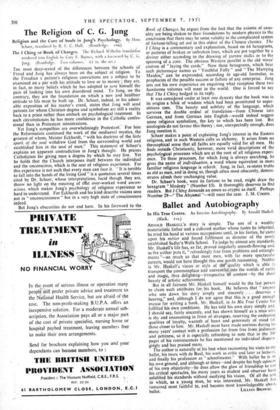The Religion of C. G. Jung
Religion and the Cure of Souls in Jung's Psychology. By Hans Schaer, translated by R. F. C. Hull. (Routledge. tbsi.) The I Ching or-Book of Changes. The Richard- Wilhelm -translation rendered into English by Cary F. Baynes, with a foreword by C. G. Jung. (Routledge. Two volumes. L2 2s. the set.) THE most deep-seated of the differences between the schools of Freud and Jung has always been on the subject of religion. To the Freudian a patient's religious convictions are a subject to be examined on a par with his attitude to love or to money - they are, in fact, so many beliefs which he has adopted to save himself the pain of looking into his own disordered mind. To Jung, on the contrary, they are the foundation on which a new and healthier attitude to life must be built up. Dr. Schaer, indeed, in his admir- able exposition of his master's creed, states that Jung will send patients for whom Christian dogma and symbolism are still a reality back to a priest rather than embark on psychological treatment. In such circumstances he has more confidence in the Catholic confes- sional than in Protestant ministrations.
Yet Jung's sympathies are overwhelmingly Protestant. For him the Reformation continued the work of the' mediaeval mystics, the greatest of whom, Meister Eckhardt, " with his doctrine of the little spark of the soul withdrew God from the surrounding world and established him in the soul of man." This statement of Schaer's explains an apparent contradiction in Jung's thought. He praises Catholicism for giving man a dogma by which he may live. Yet he holds that the Church interposes itself between the individual and the unconscious, which is the seat of religious experience. For this experience is not such that every man can face it. " It is terrible to fall into the hands of the living God " is a quotation several times cited by Dr. Schaer, whose interpretations, lucid though they are, throw no light on the meaning of that over-worked word uncon- scious, which makes Jung's psychology of religious experience so hard to understand. For Eckhardt and his kind describe visions seen not in " unconsciousness " but in a very high state of consciousness indeed.
But Jung's obscurities do not end here. In his foreword to the Book of Changes. he argues from the fact that the axioms of caus- ality are being shaken to their foundations by modern physics to the conclusion that there may be some validity in the complicated system of fortune-telling set out in this oldest of the Chinese classics. The I Ching is a commentary and explanation, based on 64 hexagrams, or patterns of broken or unbroken lines, which are put together by a diviner either according to the drawing of yarrow stalks or to the spinning of a coin. The obvious Western parallel is the old wives' custom of "laying the cards." Now these hexagrams, which bear such picturesque names as " Youthful Folly " and " The Marrying Maiden," ,can be expounded, according to age-old formulae, as prophecies of the possible success or failure of any enterprise. Jung sets out his own experience on enquiring what reception these two handsome volumes will meet in the world. One is forced to say that The I Ching hedged in its reilly.
It was consi4ered under at least one dynasty that the book was in its origins a bdok of wisdom which had been prostituted to super- stitious uses. The beauty and subtlety of the language, which survives the double ordeal of translation—from Chinese into German, and from German into English—would indeed suggest some religious symbolism,, the key to which has been lost. But sinologists do not favour this theory ; nor, unexpectedly enough, does Jung mention it.
Schaer makes a point of explaining Jung's interest in the Eastern religions, and in such Western cults as alchemy. It arises from no theosophical sense that all faiths are equally valid for all men. He finds outside Christianity, however, more vivid descriptions of the psychological processes which are at the root of all religious experi- ence. To these processes, for which Jung is always searching, he gives the name of individuation, a word whose equivalent in more familiar religious language is rebirth. Jung, in fact, re-states truths as old as man, and in doing so, though often most obscurely, demon- strates afresh their unchanging value.
Dr. Schaer's book, were its fortune to be read, might draw the hexagram " Modesty " (Number 45). It thoroughly deserves to find readers. But I Ching demands an omen as cryptic as itself. Perhaps Number 29—" The Abysmal "—will meet the case. J. M. COHEN.


































 Previous page
Previous page